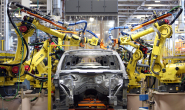Analysis

March 18, 2022
Toyota Cuts March Production on Chip Shortage
Written by David Schollaert
Toyota North America has scaled back its production by an estimated 35,000 vehicles in March, with more reductions in April still possible due to the prolonged global microchip scarcity, a company spokesperson told Steel Market Update (SMU).
![]() “Toyota’s North American plants continue to face intermittent production delays due to many supply chain disruptions,” she said. “We estimate a reduction of 35,000 vehicles in March.”
“Toyota’s North American plants continue to face intermittent production delays due to many supply chain disruptions,” she said. “We estimate a reduction of 35,000 vehicles in March.”
The North American subsidiary of Japanese-based Toyota Motor Corp. said that although they continue to diligently work to minimize the impact of the semiconductor shortage, the state of the supply chain remains fluid, likely impacting April’s production outlook in North America.
Toyota’s spokeswoman would not specify which plants or models would be impacted, noting that those dynamics are ever-changing due to the fluid nature of the microchip and parts allocation.
The lack of chip readiness continues to disrupt North American automakers nearly two years after the scarcity first resulted in widespread production outages.
Among other automakers most recently affected are Ford, Honda and Subaru.
Ford’s Avon Lake, Ohio, assembly plant was most recently idled during the week of March 14 due to the semiconductor shortage. The plant produces Ford’s E-Series cutaway and strip chassis, and the F-650, F-750 and Ford Super Duty trucks.
Honda’s North American operations also adjusted production during the week of March 14. Though the company would not provide details to SMU on specific facilities or models, the automaker’s spokesperson said the shifts were based on parts supply availability.
Subaru noted that “parts availability is an ongoing issue that can result in production fluctuations throughout any given week.” Other issues, including supplier staffing, have also caused disruptions for Subaru, a company spokesperson said.
General Motors Co. said it has no news to report for at least another week. Neither did Stellantis, Nissan or Daimler – all reporting steady production.
By David Schollaert, David@SteelMarketUpdate.com






